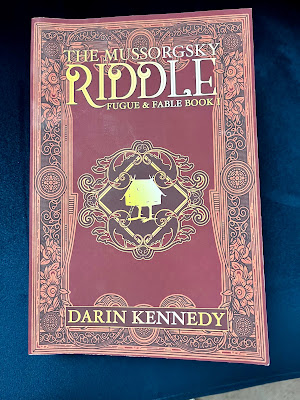(Following links on this blog may result in my earning a small fee. As an Amazon associate I may earn from qualifying purchases.)
Last year at ConCarolinas (a convention held in Charlotte, North Carolina, every year), I purchased a book from author Darin Kennedy. I was attracted to the book's cover as I passed by his table on my way to a talk and stopped to look at it. The Mussorgsky Riddle is the first book in the three-book Fugue & Fable series, and once Darin told me the gist, it was an easy sale for him!
 |
| My copy of The Mussorgsky Riddle |
Psychic Mira Tejedor is hired by a family to help their son, Anthony, a very special boy who has been catatonic for several weeks. She possesses the ability to connect with the boy inside of his mind, and what she finds there is a fantastical world as Anthony's fractured psyche reveals itself through Modest Mussorgsky's suite, Pictures at an Exhibition. As she works with him, it becomes evident there is a link to a real-world missing person's case: a local teen with a tie to the family has gone missing, and it's tearing both the family and the community apart. Mira, the local police, the family, and an eminent psychologist work together to solve the riddle, but the stakes, both psychological and in the real world, are higher and more dangerous than anyone could have imagined.
This was a book unlike any I have ever read. Between the thrilling fantasy world based on Mussorgsky's work and the suspense of the missing persons case, this book was "un-put-downable"! I read it in a weekend and was so into it that there were several moments when my husband spoke to me and I simply did not hear him.
The book's experience is enhanced if you listen to the music as you are reading. While the focus is on Mussorgsky's work, there is also a reference to Rimsky-Korsakov's Scheherazade. The musical aspect spoke to me particularly because I am a classically trained musician and I majored in Russian, but anyone with an appreciation for a good fantastical thriller and classical music will become hooked by the musical theme as it weaves through the story, giving even more texture and context to this richly layered work.
[And as a side note to the author if he reads this, I am completely ear-wormed by those thirteen notes, now, myself. I can't get them out of my head!]
I plan to be patient and buy a signed copy of the next book from the author when I see him at ConCarolinas in a few months. Meanwhile, you can find this book and others by Darin Kennedy at any of the following places: the author's site, Amazon, or the publisher's website at Falstaff Books. Your local bookseller can most likely order it, too.
Five stars!



